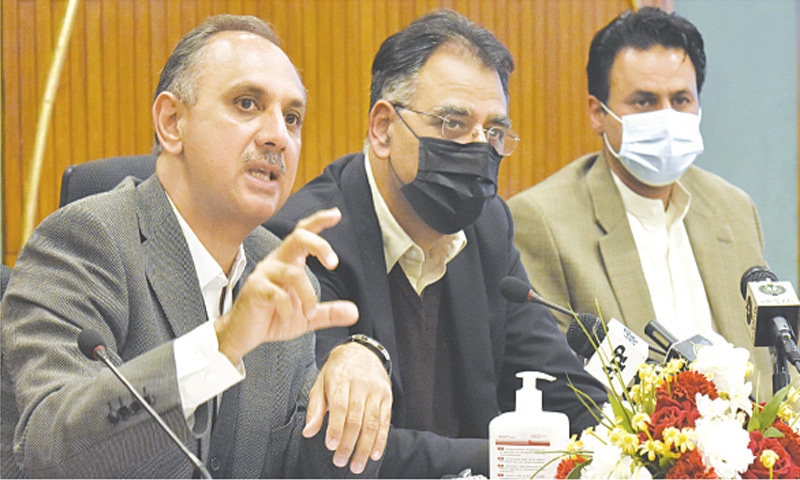• Rate increase applicable to all consumers in Pakistan
• Ministers blame PML-N govt for ‘unsustainable’ capacity payments to IPPs
ISLAMABAD: Federal Energy Minister Omar Ayub Khan on Thursday announced an increase of Rs1.95 per unit (15 per cent) in electricity tariff for all consumers in the country to generate about Rs200 billion.
At a joint news conference with Planning Minister Asad Umar and Special Assistant to the Prime Minister on Power Tabish Gauhar, the energy minister said tariff increase was being made despite tough economic conditions due to compulsions arising out of the ‘landmines’ left behind by the previous government with ill intentions.
He said the government was taking a series of measures to control “compulsory payments” and acting as a ‘shield’ otherwise tariff increase would have been around Rs8-9 per unit. He said the decision for tariff increase had been sent to the regulator to issue a schedule of tariff notification.
Under the decision, it will be the first time in almost two decades that base tariff for lifeline consumers using up to 50 units per month would be increased.
Mr Gauhar said it would not be a big thing if Rs2 per unit for this category went beyond Rs2.50.
He said negotiations had been started with sponsors of upcoming power projects of 10,000MW capacity to stagger their completion timelines to create a breathing space for power consumption and payments.
He said the PML-N government did not pass on prior years’ adjustments in tariff worth Rs227bn that should have been recovered by 2019. This required the PTI’s government to increase average base tariff by Rs2.61 per unit but Prime Minister Imran Khan decided against putting such a huge burden on the consumers at the outset. Therefore, the government increased tariff by only 23 paisa per unit at that time and had to absorb Rs2.38 per unit as subsidy amounting to Rs247bn.
Mr Omar said last year the government provided Rs473bn subsidy to the power sector despite economic crunch and Covid-19 to protect the consumers.
He said the PTI government had inherited an unsustainable level of capacity payments from the PML-N government. The agreements inked by the previous government in the power sector were based on bad intentions and corrupt practices, he said adding that due to these agreements, the increase in electricity tariff in one year alone (2019-2020) on account of compulsory capacity payments would have been Rs2.18 per unit but the government decided to increase the rates by Rs1.95 per unit only in 2021.
He said the annual capacity payments to independent power projects (IPPs) stood at Rs185bn in 2013, Rs468bn in 2018, Rs642bn in 2019, Rs860bn in 2020 and would reach Rs1.455 trillion 2023. “These are landmines that the previous government gifted our nation” he said.
Mr Gohar highlighted key initiatives being undertaken by the government to improve the power sector and reduce the flow of circular debt. He said the negotiations to convert the memorandums of understanding with 53 IPPs into final binding contracts were in final stage that would reduce the final burden on the sector by Rs836bn over the next 20 years.
Along with an even greater reduction in the rate of return on the government’s own power plants, he said, a total reduction of Rs1-2 per unit was expected in the coming years. He added that all of these agreements and any payments under them would be in accordance with the law and applicable regulations.
He said the IPPs had volunteered about 20-25pc discount in their tariffs. The payment of Rs450bn dues to the IPPs would stop accrual of 10pc markup.
He said even bigger saving of about 30pc in power rates was on account of reduction in rate of return on government-owned power plants in RLNG, thermal, old and new nuclear power plants and so on. This cut on about 8000mw would reduce burden by about Rs6tr over 30 years and would be absorbed by government.
He said the government’s recently announced industrial tariff package to boost power demand had showed encouraging results in the first couple of months and they expected to see continued progress in the coming days.
He said the government had also stared negotiations with power plants in the pipeline involving 10,000mw to stagger their completion to create breathing space as consumption had also declined due to difficult economic conditions.
The Cabinet Committee on Energy has also decided to impose a moratorium on gas supply to captive power units and incentivise them to migrate back to the national power grid. All pending new industrial connections are being expedited by the distribution companies (DISCOs). The government has already retired almost 50pc of the old and inefficient government-owned power plants to reduce their burden on the consumer tariff.
The SAPM said the federal government would start working closely with the provincial governments to share the burden of reducing electricity theft and improving recoveries in their jurisdictions, beside introducing private sector participation and mindset at the board and management levels.
Mr Gauhar said the monopoly of DISCOs would end in the next two to three years and, in the first phase, the bulk consumers would be given a “choice of supplier” via an electricity commodity exchange.
Published in Dawn, January 22nd, 2021














































